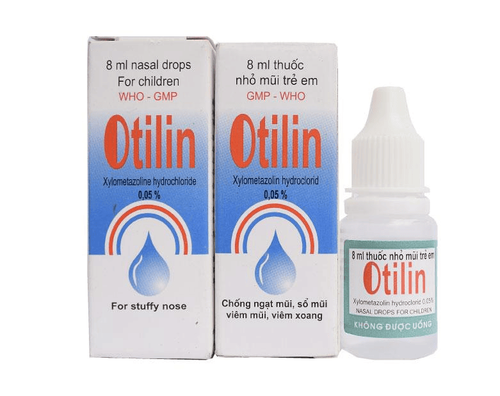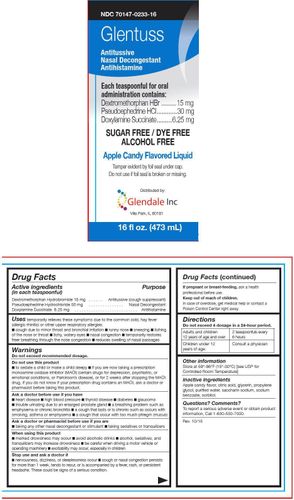This is an automatically translated article.
Alahist CF is a medicine for the treatment of colds, common colds, allergies or respiratory diseases,... In order to achieve optimal treatment effect and prevent the risk of experiencing side effects. You should use Alahist exactly as directed by your doctor.
1. What is Alahist?
The drug Alahist CF consists of a combination of dexbrompheniramine, phenylephrine and Dextromethorphan. It is used to treat common colds, allergies, flu, watery eyes, hay fever, bronchitis, sinusitis and other respiratory ailments. Specifically:
Dexbrompheniramine in Ala is an antihistamine, which helps relieve allergy symptoms such as runny and watery eyes, sneezing, itchy eyes/nose/throat; Phenylephrine is a decongestant, which helps constrict blood vessels in the nasal passages, thereby reducing symptoms of nasal congestion; Dextromethorphan is a cough suppressant that can affect the signals in the brain that trigger the cough reflex. Alahist is not used to treat coughs caused by asthma, smoking, or emphysema. On the other hand, this drug is mainly used to treat symptoms and is unlikely to completely eliminate the causative agent or help shorten the duration of the disease. Before using Alahist CF, patients should strictly follow the instructions of their doctor to minimize the risk of unwanted side effects. In addition, patients should also avoid using Alahist with cold or cough medicines containing similar active ingredients.
2. Instructions for using the drug Alahist CF
Alahist CF can be used without a doctor's prescription, but patients need to follow the instructions listed on the product packaging. For the cases of using Alahist prescribed, use it carefully as prescribed by your doctor.
Alahist CF is to be taken orally with a full glass of water (approximately 240ml). Patients can take Alahist before or after meals. If the patient has an upset stomach, it is best to take the drug on an empty stomach, possibly with milk or food. Some other recommendations of your doctor when using Alahist CF that you need to know, include:
When taking Alahist CF extended-release capsules, swallow the tablet whole, avoid chewing or crushing because this can cause problems. can cause large amounts of drug to be released at once and lead to a high risk of side effects. If it is a liquid Alahist CF, the patient should accurately measure the dose with a special measuring device, avoiding the use of household spoons. For Alahist suspension, you should shake the medicine well before taking it. When using Alahist powder, the patient should mix the medicine with a sufficient amount of water, stir well and drink all the medicine immediately. In case of taking Alahist CF chewable tablet, the patient should chew the whole tablet thoroughly before swallowing, avoiding swallowing the whole tablet.
3. Dosage of Alahist CF
Dosage of Alahist will be determined based on age, ability to respond to medication and existing medical condition. For the case of using Ala medicine to treat problems such as hay fever or allergies, the patient should take the drug regularly and regularly every day according to the dose prescribed by the doctor to achieve the best effect.
You need to avoid overdose of Alahist CF as it can lead to serious health complications such as seizures, brain damage or even death. Therefore, when detecting any symptoms that suspect an overdose, the patient should be taken to the emergency room as soon as possible.
If you miss a dose of Alahist CF, take it as soon as you remember, but do not take it too close to your next dose. At that time, you should take the medicine according to the scheduled schedule and avoid taking a double dose.
4. Some side effects of the drug Alahist CF
You need to contact your doctor or get emergency care if you have signs of an allergic reaction after using Alahist, such as swelling of your face/lips/tongue/throat, difficulty breathing or hives. In addition, the patient should also stop using alahist and notify the doctor immediately if experiencing the following side effects:
Shortness of breath; irregular heartbeat, pounding or fast heartbeat; Dizzy; Excessive stress; Difficulty sleeping; Difficulty urinating or not being able to urinate; Hypertension ; Severe headache; Blurred vision; Epistaxis ; Dry mouth, throat or nose; Feeling hot, tingling, or flushed; Feeling anxious, irritable or restless; Sleepy; Have feelings of excitement, especially in children; Having trouble sleeping, for example trouble falling asleep or staying asleep; Eat well. To deal with the side effects of dry mouth when taking Alahist CF, you can suck or chew sugar-free gum and drink enough water each day. Because Alahist can thicken airway mucus and lead to shortness of breath, patients can reverse this side effect by drinking plenty of water and other fluids (except alcohol, stimulants).
If rare side effects occur after taking Alahist, the patient needs immediate medical attention to prevent serious health risks, including:
Easy bleeding or bruising on the skin; Convulsions; Fast, erratic, or slow heartbeat.
5. Some things to keep in mind when using Alahist CF
You need to avoid taking Alahist CF if you are allergic to active ingredients such as dextromethorphan, dexbrompheniramine or phenylephrine. Also, you should not take cold or cough medicine if you have used an MAO inhibitor within the past 14 days. This can lead to dangerous drug interactions. Certain MAO inhibitors, including linezolid, furazolidone, rasagiline, isocarboxazid, phenelzine, linezolid, selegiline, or tranylcypromine.
In addition, you also need to discuss with your doctor whether it is safe to use Alahist if you are suffering from the following problems:
Chronic obstructive pulmonary disease (COPD); Asthma ; Cough with phlegm or chronic bronchitis; Glaucoma; Kidney/liver disease; Diabetes ; a blockage in the intestines or in the stomach; Heart disease; High Blood Pressure; Problems urinating; Thyroid disorders; Are pregnant or nursing; Phenylketonuria (PKU).
6. What drugs does Alahist CF interact with?
As mentioned above, patients should avoid taking Alahist with MAO inhibitors because it can cause serious drug interactions, even death. Ideally, MAO inhibitors should be avoided for at least 2 weeks before starting treatment with Alahist CF. In addition, a number of other drugs may also interact with Alahist, including:
Antispasmodic drugs, such as belladonna Alkaloids or Atropin ; Antihistamines (topical form) or Cetirizine; beta blockers such as Atenolol or Metoprolol; Medicines for Parkinson's disease; Tricyclic antidepressants; Opioid pain relievers; Sedative drugs such as Lorazepam, Alprazolam, Zolpidem; cough suppressants such as Hydrocodone or Codeine; Vapor anesthetics; Muscle relaxants such as Cyclobenzaprine or Carisoprodol. Ideally, patients should inform their doctor about the drugs they are taking, and carefully check the active ingredients in the medicine to avoid overdose or drug interactions. Also, some medications can affect blood pressure and heart rate, so talk to your doctor about taking them safely.
7. What should patients avoid when using Alahist CF?
Here are some things that patients should avoid during treatment with Alahist, including:
Avoid drinking alcohol with Alahist CF as it can cause side effects; Avoid taking with cough or cold medicine with the same active ingredient; Avoid driving or operating machinery while using Alahist if you have symptoms of drowsiness or dizziness. When using the drug, the patient should store it in a dry place, away from light and high humidity. Alahist also needs to be placed in a high place, avoiding contact with children or household animals.
Please dial HOTLINE for more information or register for an appointment HERE. Download MyVinmec app to make appointments faster and to manage your bookings easily.













